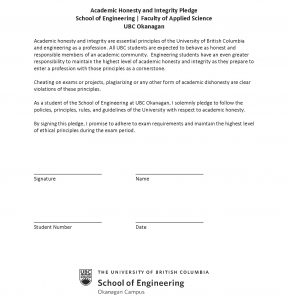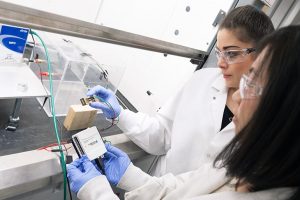Alumni Profile – Jenny Hostland ’16 (Civil)
Jenny Hostland (BASc ’16, Civil) is a Transportation Planner currently undertaking a Masters in Energy & Transport Management in Austria.
Preparing for online learning
As institutions across the globe continue to shift their teaching methods as a result of the pandemic, students and faculty at the School of Engineering on the Okanagan campus of the University of British Columbia are embracing the change.
Students sign integrity pledge
With online learning and assessment taking place this year as a result of COVID-19 physical distancing requirements, School of Engineering students are signing an integrity pledge prior to each exam.
Coronavirus (COVID-19) and UBC’s response
Countries around the world, including Canada, are working to contain the current outbreak of the coronavirus disease (COVID-19).
UBC Okanagan awarded Industrial Research Chair in advanced resource recovery from wastewater
UBC Okanagan announced today that Engineering Professor Cigdem Eskicioglu has been named the Senior Industrial Research Chair (IRC) in advanced resource recovery from wastewater.
UBCO research team sniffs out competing cannabis breathalyzers
It’s only a matter of time before breath detection devices, targeting drivers who are too high to drive, will be in the hands of enforcement agencies.
UBCO students put cosmic ray research aloft
A group of UBC Okanagan students have won the opportunity to launch a science experiment into the stratosphere with help from the Canadian Space Agency.
Convocation is a time of celebration at UBCO
This week UBC Okanagan celebrates its students as it hosts six separate graduation ceremonies over two days. More than 1,725 students will cross the stage, earning their undergraduate degrees while 215 students will receive their master’s degree and 40 their doctorates.
Does being seen really make cyclists safer on the road?
Researchers from the UBC Okanagan School of Engineering have determined motorists tended to give cyclists wearing high-visibility vests more room on the road, compared to cyclists without high-visibility clothing.
Safer donation bins a step closer to reality
A project to prevent people from getting trapped in clothing donations bins has received a boost in funding.





